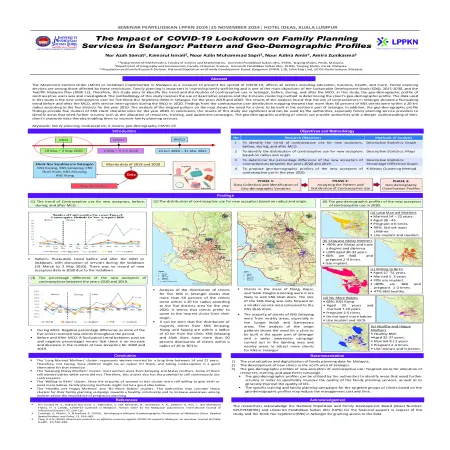|
The impact of covid-19 lockdown on family planning services in Selangor: pattern and geo-demographic profiles
|
|
: 100384 Views : |
| Item type | Scientific Poster |
| Subjects | 600 Technology > 607 Education, research & related topics |
| Division/Agency | LPPKN - National Population and Family Development Board, Malaysia: Population and Family Research Division |
| Keywords | Covid-19, Familly planning |
| Additional Information | This poster have been presented at Seminar Penyelidikan LPPKN 2024, November 25, 2024 in IDEAS Hotel Kuala Lumpur. |
| Abstract | The Movement Control Order (MCO) or lockdown implemented in Malaysia as a measure to prevent the spread of COVID-19, affects all sectors including education, business, health, and more. Family planning services are among those affected by these restrictions. Family planning is important in improving family well-being and is one of the main objectives of the Sustainable Development Goals (SDG), 2015-2030, and the Twelfth Malaysia Plan (RMK-12). Therefore, this study aims to identify the trend and distribution of contraceptive use in Selangor, before, during, and after the MCO. In this study, the geo-demographic profile of contraceptive users was also investigated. The methodology of this study involves the use of descriptive analysis and the K-means clustering method in determining the client's geo-demographic profile. The data used in this study is the new contraceptive user for five Klinik Nur Sejahtera (KNS) in Selangor, for the years 2019 and 2020. The results of the analysis found that the use of contraceptives in Selangor showed a fluctuating trend before and after the MCO, with service interruptions during the MCO in 2020. Findings from the contraceptive user distribution mapping showed that more than 50 percent of KNS clients were within a 20 km radius according to the five districts for the year 2020. The analysis of the original pattern on the map shows the need for a clinic to be built in the northern part of Selangor. In addition, the geo-demographic profile findings provide five clusters of KNS client characteristics for the year 2020. In conclusion, the results of this study are significant and can be used by the authorities, especially family planning service providers to identify areas that need further scrutiny such as the allocation of resources, training, and awareness campaigns. The geo-demographic profiling of clients can provide authorities with a deeper understanding of their client's characteristics thereby enabling them to improve family planning services. |











